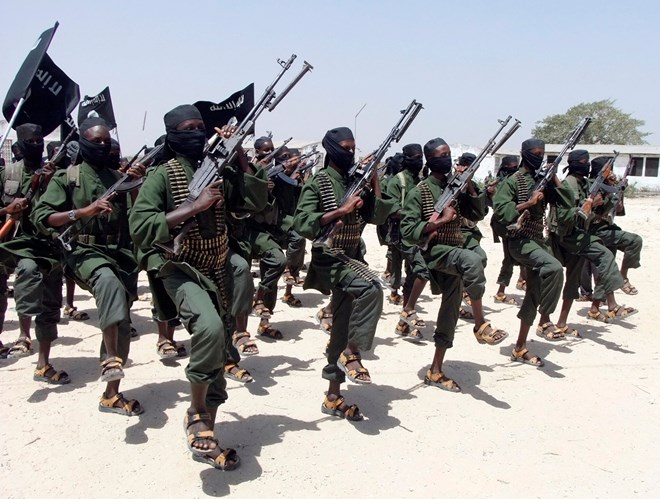
Saturday July 3, 2021
By Abdi Latif Dahir
The attack in the capital, for which the terrorist group Al Shabab claimed responsibility, comes as the Horn of Africa nation begins a crucial election season.

Shabab fighters training in 2011.Credit...Farah Abdi Warsameh/Associated Press
NAIROBI, Kenya — At least 10 people were killed and dozens injured in a suicide explosion in the Somali capital, Mogadishu, on Friday evening, the authorities said, the second such attack to rock the city in weeks as the country enters a crucial election season.
A suicide bomber detonated his explosive-laden vest near a cafe close to the well-known Juba Hotel, which is in a strategic area that houses government ministries and the intelligence headquarters. The cafe, frequented by members of the Somali security forces, was crowded with patrons when the attack took place, officials said.
The Somali government blamed the terrorist group Al Shabab, and the group itself took responsibility, saying that it had targeted intelligence, police and military forces. Al Shabab claimed the blast killed at least 15 people and wounded 22 others.
Somali security officials did not respond to multiple requests for information on whether government officers might have been killed or injured in the attack.
“Once again Al Shabaab has proven that their violence has no bounds and will kill indiscriminately,” Somalia’s Ministry of Information, Culture and Tourism said in a statement on Saturday. Al Shabab, the ministry added, strives “to cause pain, destruction and chaos. These ideals have no place in a free Somalia.”
The attack came just weeks after another Al Shabab suicide bomber attacked a Somali Army training camp that is jointly managed with Turkish forces, killing at least 10 people and wounding 20 others.
In recent months, Al Shabab has stepped up its attacks as Somalia has been rocked by political infighting, the withdrawal of most American troops and a pause in American drone strikes that had targeted the group and its leaders.
The latest suicide attack occurred just days after the prime minister, Mohamed Hussein Roble, announced a timeline for long-delayed elections, aiming to mend a potential political standoff that has burst into deadly violence at times.
That political crisis began when President Mohamed Abdullahi Mohamed, a former American citizen and bureaucrat, failed to hold presidential and parliamentary elections in February as scheduled and then sought to extend his term in office by two years.
Under the current plan, revealed Tuesday by Prime Minister Roble, elections for the Senate and Parliament will take place from mid-July through September, with the presidential election set for Oct. 10. Somalia has not had direct elections in decades, with clan elders in the past picking lawmakers who in turn selected the president.
Mr. Roble condemned the attack on the cafe, saying that the Shabab was determined to harm innocent Somalis.
Al Shabab has in the past attacked busy intersections, restaurants and hotels — killing dozens of people at a time and solidifying its reputation as Al Qaeda’s largest and most active global affiliate. To help combat the group, the Pentagon is weighing a plan to send dozens of troops back to Somalia.